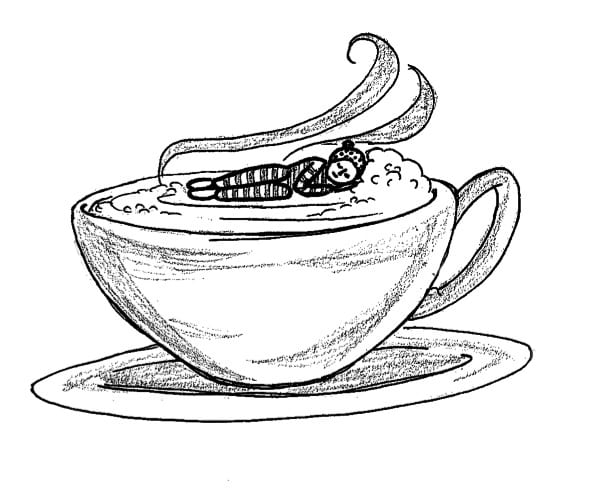Excuse me while I get up on my soapbox and put my ex-Wellness Center Peer Educator hat on. No matter how many cups of coffee you have, nothing can replace the effect a night of good sleep has on your ability to learn, retain and recall information. Nothing.
Pardon my dramatization, but it seems to be a common conception on this campus that there’s some sort of magic ratio that will give you the same learning potential eight hours of sleep would – such as substituting one cup of coffee for every one hour of missed sleep. We carry mugs covered in all-day-coffee stickers like each one is a merit badge earned from a late night of studying.
Caffeine cannot replace sleep, and I think deep down we realize that. I’ve definitely made it through many lectures fully awake thanks to the cup of black tea in my hand, but the moment they were over, I was unable to recall anything that had happened or had been said.
This zombie-like effect arises out of the science of caffeine; it is an addictive drug that acts on adenosine receptors in the brain. Adenosine accumulates in the brain over the course of the day in accordance with your circadian rhythm and makes you weary. Caffeine binds to adenosine receptors in the brain without producing the same groggy effects adenosine would and prevents actual adenosine from binding to the receptors.
This process activates your body’s fight-or-flight response: the rapid beating heart and sense of anxiety you get after coffee would be the same feeling you would have if you were being chased by a tiger in the wild.
In short, caffeine increases arousal by acting on your fight-or-flight response. Astrid Nehlig published a review article in the Journal of Alzheimer’s Disease confirming this fact. Nehlig also said that caffeine – in moderate doses – can increase concentration and elevate mood. As much as I hate to admit it, caffeine can also help learning in situations of decreased arousal: So if you didn’t sleep much one night and need to learn the next day, coffee is not a bad idea.
However, Nehlig notes that in higher quantities, caffeine increases blood pressure and heart rate to a maladaptive level. Caffeine also prevents you from using new information and storing new memories. This means that what you read or learn is likely to slip right out of your brain within the day.
The other factor that plays into memory, and thus into learning as well, is the sleep cycle. Ruth Bolstad, Academic Strategist and Consulting Coordinator for the Academic Support Center, explained that part of the sleep cycle is spent re-creating the chemicals needed for learning. Interrupting that process or not letting it come to completion leaves our ability to learn incomplete.
Not sleeping also makes us tired, obviously, so we equate these two processes as one and the same. That’s why we think drinking coffee will allow us to learn better. In reality, coffee does nothing to restore those chemicals that help us to retain or process information, and this caffeinated crutch we often lean on actively hinders the learning process. In the big picture, this means we have to alter our sleep habits in order to achieve our highest academic performance.
Just as an added caveat, in a sleep study published in the College Student Journal, William E. Kelly studied students who consistently got eight hours of sleep and compared them to students who usually got six. Stanford did a study where they paid students to get an hour more of sleep a night, no matter what they averaged before.
What did these researchers find? Students who got more sleep had higher GPAs in both instances. Just think: increasing your GPA could be as easy as just going to bed.
Michael Enich ’14 [email protected] is from Chicago, Ill. He majors in religion.
Graphic Credit: ALLI LIVINGSTON/MANITOU MESSENGER



